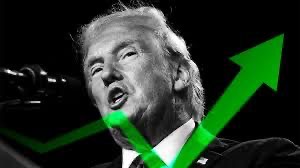
Reported by Tahir Ishaq Shehu
U.S. stock markets pulled back Friday as President Donald Trump reignited global trade tensions, announcing sweeping new tariff measures. The Dow Jones Industrial Average tumbled 279 points, or 0.6%, ending a three-week winning streak. The S&P 500 and Nasdaq Composite also retreated from record highs, shedding 0.3% and 0.2%, respectively.
Trade Fears Return to the Fore
Markets turned lower after Trump unveiled plans to impose a 35% tariff on Canadian imports not covered under the USMCA agreement, effective August 1. The president also signaled his intent to raise tariffs on imports from Japan, South Korea, and the European Union to between 15% and 20%, and to implement a 50% levy on Brazilian goods.
The announcement marks a sharp turn from what investors had dubbed the “TACO trade” a belief that Trump would “Always Chicken Out” of full-scale trade wars. That assumption was upended Friday, prompting concerns over inflation, global growth, and corporate profit margins.
“This is the first major sign that Trump’s protectionist instincts may override market-friendly rhetoric heading into the fall,” said Melissa Chang, chief strategist at Eastbridge Capital. “It’s a wake-up call.”
Sector and Stock Highlights
Financials and materials were among the worst performers, with companies heavily reliant on global supply chains hit hardest.
In contrast, AI and chip stocks proved more resilient. Nvidia briefly crossed the $4 trillion market cap milestone before paring gains, while AMD rose nearly 4% on robust demand outlook.
Airline stocks saw mixed results. Delta Airlines got a lift from better-than-expected second-quarter earnings, but peers like United and American fell in line with broader market weakness.
Cryptocurrencies bucked the trend. Bitcoin surged past $118,000, buoyed by institutional inflows and optimism over upcoming crypto legislation.
Looking Ahead: Data and Earnings
The pullback comes just ahead of a critical period for investors, with second-quarter earnings season set to begin in earnest next week. Reports from JPMorgan Chase, Netflix, and TSMC are expected to offer insight into the health of the corporate sector.
Meanwhile, upcoming inflation data could shape expectations for the Federal Reserve’s next move. While a rate cut in July now seems less likely, markets continue to price in a potential September easing, depending on the strength of upcoming macroeconomic indicators.
“Volatility may rise in the short term as the market digests geopolitical risks alongside corporate earnings and Fed policy shifts,” said Luis Ferrera, macro strategist at Lighthill Partners.
The Bottom Line
After months of relative calm and record-setting gains, Wall Street is once again grappling with geopolitical risk, this time in the form of renewed trade hostilities. While growth sectors like AI and crypto have shown resilience, a broader risk-off tone is setting in as investors await clarity on both policy and earnings
